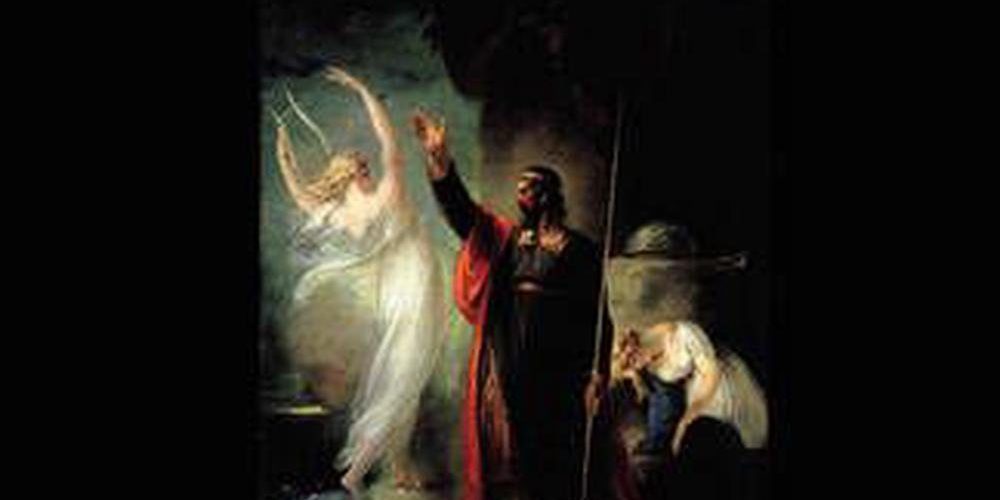-“The red plague rid you/For learning me your language!” (1.2)
(Does Shakespeare mean Miranda failed in her job as a teacher, and that Caliban needs to be taught the difference between teaching and learning ?)
( Prospero to Miranda, about Caliban. Sex is fire, it burns; it gives the necessary warmth; and it is also the necessary fuel for life . The institution of marriage is an insurance against Calibanism, the ugly form of suppressed sex.)
( The colonisation of a country is complete only with the overpowering of the woman.)
( Man has to own the Caliban in him .Caliban is the symbol of animal sex, as well as, animal innocence.)
-The play within the play:
The Tempest is one of the two plays in which Shakespeare observed Aristotle’s Three Unities.(Comedy of Errors is the other play. )The whole action in The Tempest takes place on an island. The duration could be three days, or three hours. And the themes ?
It would be difficult to name a theme not dealt with in The Tempest . There is colour, race, colonialism, imperial intriguing, the institution of marriage, child-parent relationship, utopias- political, aesthetic, and moral . And last but not the least, the theme of theatre art, and of all art. The very beginning of the play is a play-within-a-play which is an experiment in mixing magic with theatre magic. And Miranda is the ordinary spectator, whereas Prospero is watching the play of magic as a director would the preview of his magnum opus, the crucial culmination of his art of magic . The Tempest has a world of themes. It can be said to be the most ambitious of Shakespeare’s plays in its sweep of thought , and range of vision.Considered the last of his plays, it is the culmination of Shakespeare’s magic art. Shakespeare is the real magician in the play. The Tempest was the most modern of his plays in his time, and is as modern, and most postmodern today.
Actually, the play is not character-studded. Ariel is mere air, invisible to the spectators or the other characters in the play, except to Prospero.He is hardly human, (“ were I human”, he says.) Caliban is only half human. Ferdinand and Miranda are little more than beautiful toys. And Prospero is more a director of the play than a character in it. It is a play of ideas, but the magic of Shakespeare, renders us oblivious to the fact that the play has no character that can be called sufficiently human. This is about the content of the play.
Its structure is hardly less amazing. Nearly every word in it is intricately interwoven with the other words in the play. Mastery of a language is not one’s extent of vocabulary, or extension of a vocabulary , but its structuring in a poem or a play or any other literary work. Using “learning” for “teaching” is an instance of Shakespeare’s mastery of language.This is not a joke. “The red plague rid you/For learning me your language!”, Shakespeare is actually saying, behind Caliban’s ignorant mask, that a coloniser can’t teach without learning the colonised language. Conquest is never one sided.
And his way of thinking in images:
“Sebastian:
I think he will carry this island home in his pocket
and give it his son for an apple.
Antonio:
And, sowing the kernels of it in the sea, bring
forth more islands.”(2.1)
This is a whole thesis on colonialist expansion , a thesis in metaphors . And this is a dialogue between two clowns! We will come to it again.
Caliban is and is not the hero of the play. ( In the twentieth century there have been plays written with Caliban as the hero.) Let us begin with Caliban.
-Labour and hunger:
The first words uttered by Caliban in the play are the cry of a hungry labourer :
“There’s wood enough within.”; “I must eat my dinner.” The woodcutter’s cry of hunger. This is Caliban’s cry, heard from behind, by the spectator before he sees him on the stage. This is the cry of the invisible colonised slave. But the cry of the colonised is not the only theme of the play.
Here’s another, more primitive hunger :
“Prospero :…(to Caliban)
I have used thee,
Filth as thou art, with human care, and lodged thee
In mine own cell, till thou didst seek to violate
The honour of my child.
Caliban:
O ho, O ho! would’t had been done!
Thou didst prevent me; I had peopled else
This isle with Calibans.( 1.2)”
This is also another face of colonialism, but one more primitive and one that envelopes and exceeds colonialism. The usual charge, valid no doubt and important enough, is the overpowering of the colonised woman. Shakespeare does make the charge in the play, in another seemingly comic context. But Shakespeare is here spreading his net wider, wider than the colonised and the coloniser, and goes deeper, to the bottom of truth. Lust knows no colour or race, or even power. It knows the power of the animal body. Mallarme’s faun seems to echo Caliban:“These nymphs I would perpetuate” (“The Afternoon of a Faun”: “Ces nymphes, je les veux perpétuer.”( L’apres midi d’un Faune).Caliban’s behind the stage cry of hunger is deeper, much much deeper. It is a more primitive hunger that knows no distinction of the colonised and the coloniser. Caliban attempted to outrage the honour of Miranda. This is not the usual story, but it’s reversal. Caliban’s attempt was thwarted, but Caliban doesn’t regret his attempt at outrage. He would have gladly littered the island with lovely little Calibans.
-Fire and Fire:
“Miranda:
‘Tis a villain, sir,
I do not love to look on.
Prospero:
But, as ’tis,
We cannot miss him: he does make our fire,
Fetch in our wood and serves in offices
That profit us. What, ho! slave! Caliban!
Thou earth, thou! speak.”
Miranda doesn’t wish to see the savage face (,(“Tis a villain, sir,
I do not love to look on.” Miranda doesn’t say “He”, but “It”).But Prospero tells her he is indispensable, for “he does make our fire”. Of course, Prospero is being sensible and practical. But Shakespeare is putting more into his words. Caliban figures in him the primal desire, that is the fuel that runs man, and also burns. Caliban represents the subliminal consciousness. But he is also the desire that runs the machine of creation and procreation. What happens when the desire is extinguished is what the myth of the demon Bhandasura says. He ordered the extinguishing the sex desire in all creatures, so that there would be no procreation,and no proliferation of gods. But the desire, destroyed by the demon or by the God of Gods, had to be given new life. (Lord Siva turned the deity of desire, Manmatha, the Indian version of Cupid, into ashes, Siva’s consort gave him life. The Taittiriya Upanishad says , “He desired”( soఽkaamayata : 8.6). The same Upanishad orders, “ see that the line of progeny is unbroken”(prajaatantum maa vyavatseccheeh).Desire is the libidinal energy. Shakespeare’s metaphor of fire has so much polysemous fuel in it. It runs the story at four levels.
-Dethronement and Exile:
The opening scene of the play. A ship is caught in a terrible storm. A young girl and her father are watching from the safe shore, but the girl is worried about the people on the ship. Her father is watching it like a producer-director does his premiere show. He knows how his drama would end, and assures his daughter that all would end well . The daughter had been asking him for the last twelve years why they had been on the island, and he had been saying he would tell her some day. And he is now telling the story, keeping the ending to himself, as would a good storyteller. It is not easy to speak to his dearest daughter, how she had been deprived of her joys of childhood, exiled along with her father on a savage island. The father is more pained for his daughter than for himself, who had been dethroned and exiled by thankless brother. One can only imagine the young girl’s state of mind when the story is being unfolded, and the father narrates the pain that he had kept so long for himself: .
“Prospero:
Dost thou attend me?
Miranda:
Sir, most heedfully.
……….
Prospero:
Thou attend’st not.
Miranda:
O, good sir, I do.
……..
Prospero:
Dost thou hear?
Miranda
Your tale, sir, would cure deafness.”
How would a young daughter react to that story, which is no longer a storm-story on the sea, but a storm in her own mind ? She could not have been so inattentive as needs to be asked, “Dost thou hear?” Miranda is so shocked with the story that she is oblivious of the storyteller. The dramatic purpose of this seeming question is not to ascertain whether she is listening. Prospero is not such a fool as to think that Miranda’s mind is wool gathering. His question is a statement of her state of mind then, her shock, her grief, and her retrospective tension. This is Shakespeare’s dramatic art. A seeming doubt can be a loud assertion.
But Prospero, the storyteller , needed a pause too. A storyteller,after all should take no sides, especially more so while the story is one’s own. Prospero is examining his own part in the story of dethronement and exile. Was he entirely free from guilt? Should he, could he , and how much should he confess his guilt? It requires to detach himself, and think in terms of a third person. He begins to see himself in two roles, and refers to himself in the third person:
“And Prospero the prime duke, being so reputed
In dignity, and for the liberal arts
Without a parallel; those being all my study,
The government I cast upon my brother
And to my state grew stranger, being transported
And rapt in secret studies. Thy false uncle–
Dost thou attend me?”
His seeming calls to the listener’s attention are indeed the breaks needed by Prospero for self examination.
A doubt arises as to why Antonio did not kill his brother and his child then and there? Why did he choose to put them to sea? Miranda did ask this question.
Miranda:
Wherefore did they not
That hour destroy us?
Prospero:
Dear, they durst not,
So dear the love my people bore me, nor set
A mark so bloody on the business, but
With colours fairer painted their foul ends.
Prospero was a popular ruler and was so dear to his people that Antonio feared his good name, and dared not to murder him and his child daughter. Dhritarashtra in the Mahabharata gave a similar reason for ending the lives of the Pandavas, sons of his deceased brother. He made several covert attempts to have them killed. It is neither difficult nor unusual for a king to murder the rivals to his power. But why did not Dhritarashtra do so? Moreover, he , in the presence of several elders announced Yudhishthira ( Dharaja) as the heir to the throne, and committed himself. When his son asked him why he committed himself so foolishly, the father told him that he dared not decline the throne, or eliminate the Pandavas openly, because he feared their good name. Pandavas were more popular than their mighty ancestors, and enjoyed greater reputation for their goodness. So Dhritarashtra resorted to covert attempts to eliminate the Pandavas. Macbeth similarly feared Duncan’s good name.
“…this Duncan
Hath borne his faculties so meek, hath been
So clear in his great office, that his virtues
Will plead like angels, trumpet-tongued, against
The deep damnation of his taking-off;
And pity, like a naked new-born babe,
Striding the blast, or heaven’s cherubim, horsed
Upon the sightless couriers of the air,
Shall blow the horrid deed in every eye,
That tears shall drown the wind.”
Of course, eventually, he did murder Duncan. Antonio is no Macbeth. He hadn’t had a fourth witch for his wife. Instead, he fondly trusted the cruel sea to do the job for him.
(to be continued)









Add comment